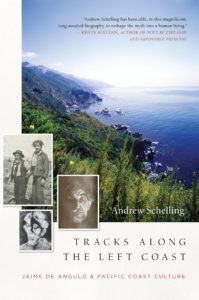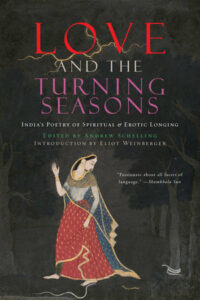Andrew Schelling
Andrew Schelling is a poet, essay writer, and translator. He works on land–use issues in the American West and teaches poetry and Sanskrit at Naropa University in Boulder, Colorado.
Jaime de Angulo was a cowboy, cattle rancher, horse tamer, medical doctor, psychologist, and linguist. A friend and colleague of Carl Jung, Henry Miller, and D. H. Lawrence, de Angulo was the author of Indian Tales and many other titles, all published posthumously.
Subscribe to our newsletter for news & events from Counterpoint Press.
Books
Tracks Along the Left Coast
Jaime de Angulo & Pacific Coast Culture
“Tracks Along the Left Coast more than accomplishes its self–appointed task of celebrating de Angulo’s legacy.” —Rain Taxi“Schelling’s biography of Jaime de Angulo—'cattle puncher, medical doctor, bohemian, buckeroo,' among other things—presents a fascinating, full–bodied portrait of a man and an era, as well as delving deep into California’s Native history. De Angulo’s isn't a household name, but in Schelling's work the man called by Ezra Pound the 'American Ovid' comes blazing to life in all his singular brilliance.” —Stephen Sparks, Literary Hub
California, with its scores of native languages, contains a wealth of old–time stories—a bedrock of the literature of North America. Jaime de Angulo's linguistic and ethnographic work, his writings, as well as the legends that cloak the Old Coyote himself, vividly reflect the particulars of the Pacific Coast. In each retelling, through each storyteller, stories are continually revivified, and that is precisely what Andrew Schelling has done in Tracks Along the Left Coast, weaving together the story of de Angulo's life with the story of the land and the people, languages, and cultures with whom it is so closely tied.
Love and the Turning Seasons
India's Poetry of Spiritual & Erotic Longing
For thousands of years, India has excelled at erotic love poetry, and the genius of its devotional poetry often harnesses great energy and mystical insight. It is in fact often hard to tell whether the poets are offering poems of spiritual longing using the garment of love poetry, or writing erotic poems in the guise of devotion. Perhaps, in a country where erotic sculpture routinely ornaments its many temples and the gods are known for their explosive sexuality, this question has little meaning to these remarkable writers. In their devotional traditions, eroticism and mysticism seem inseparable.This wonderful selection spans 2,500 years, and includes work originally sung or recited by their well–known bards: Kabir, Mirabai, Lal Ded, Vidyapati and Tagore. There are also poems from the Upanishad, from ancient Sanskrit poetry and Punjab folk lyrics. The poets have largely emerged from the ranks of the dispossessed: leather workers, refuse collectors, maidservants, women, & orphans. Their vision is of a democratic society in which all voices count, much like American gospel and blues, Shaker songs, or the grand vision of Walt Whitman. Often they faced persecution for speaking candidly, or daring to speak of spiritual matters at all. The notes include profiles of these legendary lives. Several of these poets simply vanished, absorbed into a deity, or disappeared in a flash of purple lightening. A few produced miracles—most of them have clouds of mystery around them.
Andrew Schelling has drawn on the work of 24 other translators, including Ezra Pound, Robert Bly, W. S. Merwin, Jane Hirschfield and Denise Levertov, to build what will be the finest anthology of India's erotic and spiritual poetry for the general read ever assembled.

Catapult | Counterpoint | Soft Skull
20 Jay Street #704
Brooklyn, NY 11201
646.926.0805 | contact@catapult.co






